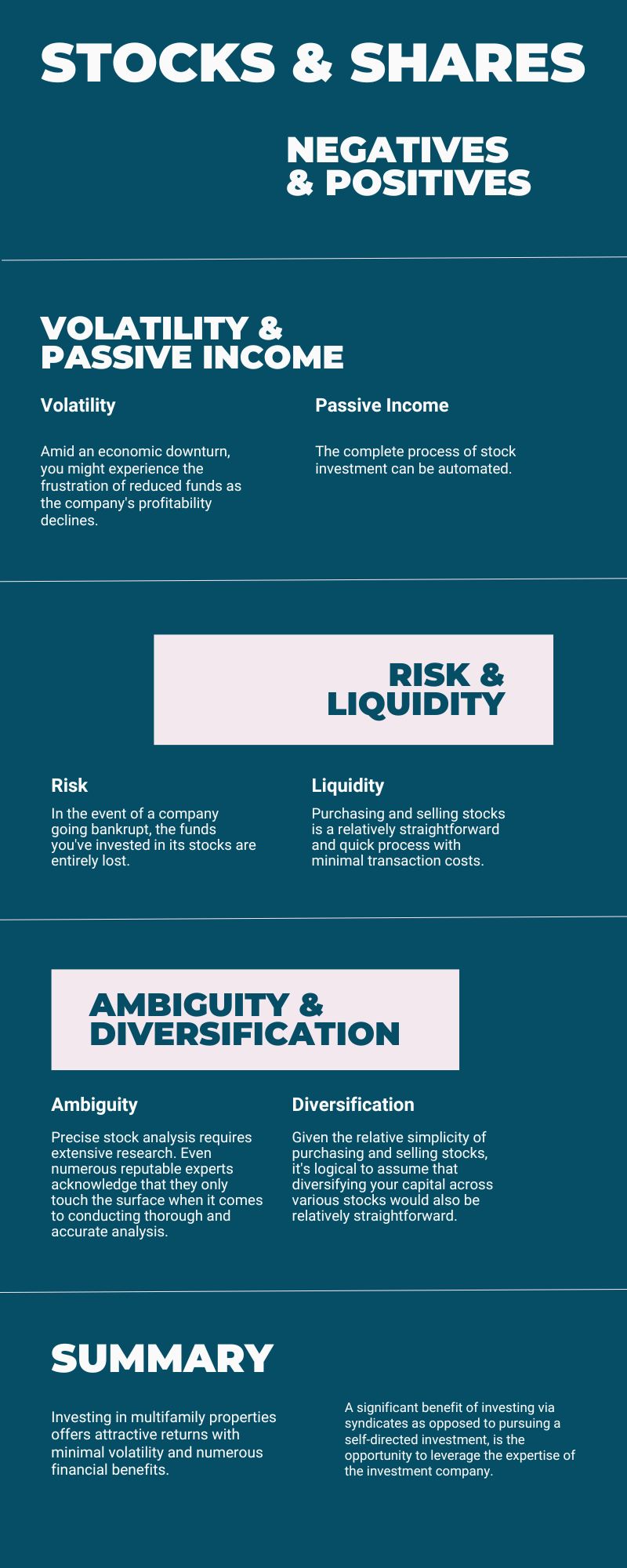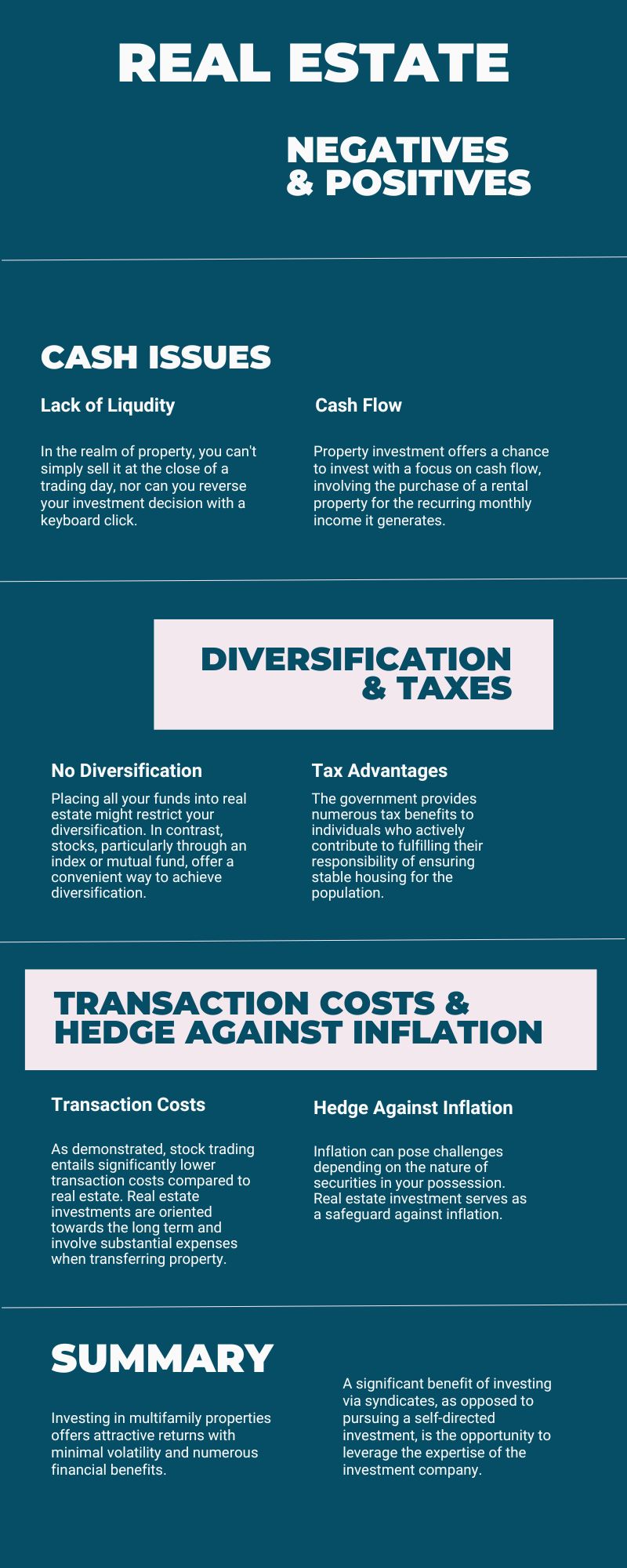While investing in stocks and shares may seem more accessible to many at first glance, have you considered the potential of real estate investment?
Real estate investment offers distinct advantages such as low risk, stability, and predictability. Coupled with significant tax benefits, a hedge against inflation, and control over the investment, it often outweighs the appeal of stocks and shares.
Let’s delve into some of these pros and cons.

Stocks and Shares – Positives and Negatives
Negatives
1. Volatility
Experiencing financial setbacks due to a sluggish economy is a reality when a company’s profitability decreases. While stock prices are notoriously unstable based on daily events, savvy traders generally adopt a long-term perspective. Still, the fickle nature of stocks can emotionally drain investors.
2. Risk
Stocks inherently carry risk, influenced not only by the broader economy but also by a company’s performance and, crucially, by the actions of its imperfect leaders. A company’s bankruptcy can erase your investment entirely. Many investors favor opportunities where they exert more control, reluctant to embrace such pronounced risk. In today’s era of instant and sometimes false news, stock prices can dramatically shift. For instance, Audience ($ADNC) witnessed a 25% stock dip on January 29, 2013, following a misleading tweet by @MuddyWaters about a DOJ investigation—a claim later clarified as false.
3. Ambiguity
Truly understanding stocks demands extensive research. Many genuine experts concede they only grasp a fraction of the needed analysis. Investing in stocks means buying a piece of a company. Your fortunes rise and fall based on that company’s health.
Positives
1. Passive Income
The stock investment process can be entirely automated. Unlike property investments where hands-on involvement might be needed, opting for syndicated property deals ensures your real estate income remains passive, keeping you detached from routine property management.
2. Liquidity
The act of buying and selling stocks is efficient with minimal costs, given there’s no physical asset exchange. This quick, cost-effective transaction contrasts with property deals, which can extend over several months.
3. Diversification
The convenience of stock transactions makes it relatively easy to diversify investments across multiple stocks, helping to offset market fluctuations. Achieving similar diversification in real estate would demand significantly more capital.
Real Estate – Positives and Negatives
Real estate is a tangible asset, giving investors a sense of concrete value. One of its major draws is its stability. For countless individuals, real estate has been a source of consistent wealth and long-term appreciation. It offers a steady rental income; since having a home is a fundamental need, rental investors are safeguarded even during economic downturns.

Negatives
1. Lack of Liquidity
Unlike stocks which can be sold with a keystroke, property isn’t as easily liquidated. Often, you might need to retain it for years to achieve expected returns. It’s worth noting though that while most stocks yield around 4% or less annually, multifamily real estate often starts generating income instantly. Commonly, the average annual returns, even after all costs, exceed 10%.
2. Lack of Diversification
Investing solely in real estate may limit your diversification. Stocks, especially through indices or mutual funds, offer straightforward diversification. Yet, diversification in real estate isn’t impossible. Expert advisors can guide you in diversifying across various properties and locations, which is also a boon of syndication.
3. Transaction Costs
Stock trading boasts lower costs than real estate. Transferring property comes with its own hefty fees such as title fees, attorney charges, and agent commissions. But, the tangible nature of real estate offers investors a sense of security, bringing consistent wealth and appreciation. The steady rental income, essential to many, offers relative protection even in economic downtrends.
Positives
1. Cash Flow
Investing in property promises cash flow — the monthly income from rental properties. Effective management can further boost this income, enhancing your life quality. Smart advice in real estate can promise a regular passive income, often tax-free.
2. Tax Advantages
The government rewards real estate investors with significant tax benefits, like depreciation. This means while your property appreciates, you’re also benefiting from depreciation costs. Coupled with ‘bonus depreciation’ and ‘1031 Exchange,’ the tax perks are truly unparalleled.
3. Hedge Against Inflation
While some securities falter with inflation, real estate stands strong. Property values and rents usually adjust with inflation, making it a reliable hedge.
Summary
Investing in multifamily properties delivers impressive returns and numerous financial perks. Choosing to invest through syndicates lets you tap into the expertise of the investment firm. With them, you access the knowledge of several real estate professionals without diving deep into the intricacies of property management. We’re eager to assist you in your journey towards achieving financial independence through multifamily real estate investment.


